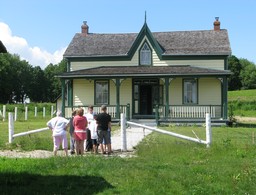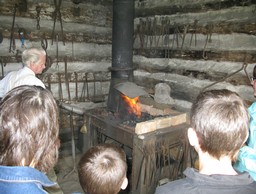John Veverka & Associates
Main menu:
- Home Page
- Our Range of Services
- Interpretive Coaching
- Interpretive Planning
- Interpretive Plan Outline
- Interpretive Training
- John Veverka Resume
- NEW Advanced Interp. Text Book
- InterpNEWS
- Library
- JVA NEWS, Courses and Updates
- Certificates
- Planning/Design of Interpretive Panels
- Interpretive Writing
- Interpretive Writing Course
- Interpretive Trails Course
- Interpretive Panels Course
- Introduction to Heritage Interpretation Course
- Interpretive Planning & Design of Marketing Brochures Course
- Training for Interp. Trainers
- Interpretive Exhibits Course
- Interpretive Master Planning Course
- Interpretive Planning for Scenic Byways.
- Critiquing and Coaching Interpretive Staff
- Advanced Interpretive Planning
- Interpretive Training Center Course Catalogue
- Interp. for International Visitors course.
- Interpretive Exhibits Evaluation
- Interp. Center Feasibility Analysis Course.
- Interp. for Commercial Tour Providers
- Interpretive Researchers Guide for Visitor Studies
- Interp. Planning for Historic Homes
- Heritage Interpretation Training Center
- Interpretive Planning for Botanical Gardens
- An introduction to planning and presenting live interpretive programs and tours for Museum/Heritage Site Docents and Volunteers.
- Developing Marketing Plans for Heritage & Tourism Sites and Attractions
- Interpretation Book Store
- Heritage Interpretation Resource Center
- Interpretive Planning for Historic Farms
- Developing Successful Partnerships
- Developing Interpretive Outreach Programs
- Community Interpretation Planning
- Interpreting Gravestones and Historic Cemeteries
- Using Interpretation to Accomplish Management Objectives.
- An Interpreters Guide for Survival Economics.
- Innovative Strategies for Interpretive Media and Services Planning.
- A Curators Guide for Developing Gallery Tours.
- Advanced Interpretive Writing - Technical Publications
- Advanced Interpretive Services for Managers, Supervisors, Team Leaders and Sr. Staff.
- Advanced Interpretation for Chiefs of Interp. - Interpretive Managers - Regional Interp. Specialists
- Interpreting Critical Issues.
- Developing Commercial Interpretation for Resorts, Cruise Ships, Campgrounds and Tourism Attractions.
- Planning and developing a new commercial tour guiding business.
- Interpretive Evaluation, Visitor Studies and Site Assessment Center
- The Center for Interpretive Planning Advancement & Excellence.
- Developing Requests for Proposals (RFPs)
- Planning and Facilitating Focus Workshops
- Planning for Interpretive Experiences
- 40 Years a Heritage Interpreter
- Interpretive Techniques - The Rest of the Story Course
- Certified Professional Interpretive Planner Certificate
- Certified Professional Interpretive Program
- Certified Professional Interpretive Writer certificate program.
- Visitor motives for attending interpretive programs.
- Exhibit Rehab Course
- Developing Training Workbooks & Manuals
- Planning for Railroad Museums and Sites.
- Climate Change Interpretation Course.
- When there's nothing left but the story - interp. storytelling.
- Interpreting Legends Myths and Fables
- InterpSHARE - Seminars 2022
- Interpreting Invasive Species
- Interpretiing Edible Insects
- Interpretaive Planning for Climate Change
- HITC Climate Crisis Resource Center
- PUP Members Only
- Starting a new Interp Consulting Business
- Panels 4 Week Course
- Interpretive Writing - 4 Week Course
- Marketing - 4 Week Course
- Intro to Interpretation - 4 Week Course
- Interp Climate Change - 4 Week Course
- Exhibit Rehab 4-Week Course
- Level 1
- Johns Interpreters Blog
- John Interpreters Blog 2
An introduction to planning and presenting live interpretive programs and tours for Museum/Heritage Site Docents and Volunteers.
Error File Open Error
An introduction to planning and presenting live interpretive programs and tours for Museum/Heritage Site Docents and Volunteers.

12 Units - 1.5 CEU credits. $50.00
This course is especially designed for Museum/Heritage Site volunteers and docents who have a passion for sharing their love of history, art, nature or other topics with visitors to their particular site, and provide their services on a volunteer basis.
Many of the docents I have had the pleasure of providing training workshops for are retired teachers, historians, naturalists or others with a desire to instill that love of their subjects with the visitors they meet and guide and really like connecting with people of all ages.
This would be a great course for docents/volunteers working in:
- Museums
- Zoos
- Historic homes and gardens
- Science museums
- Botanical Gardens and Arboretums
- Heritage attractions and facilities.
Meet me here on YouTube for a brief course introduction: https://youtu.be/3KAKj9x0YeM
About the Instructor: Prof. John Veverka
Error File Open Error
- B.S and M.S in Heritage Interpretation - The Ohio State University (Taught a course on
Interpretive Master Planning - wrote the first Interpretive Planning Text book).
- Ph.D. program in Interpretation at Michigan State University. (Taught introduction and
advanced interpretive courses including interpretive planning units.)
- Adjunct Professor Heritage Interpretation (summer heritage tourism institutes) North
Carolina State University, New York State University.
- NAI Certified Interpretive Planner and Trainer
- NAI Fellow
- Certified Professional Heritage Interpreter (Canada).
- Author of several interpretive planning/training college text books.
- Publisher of InterpNEWS - the International Heritage Interpretation e-Magazine.
- 40 years of interpretive planning, training and writing experience.
Course Goals: Upon completion of this course participants will:
- Have a working knowledge of Tilden's Interpretive Principles.
- Have a working knowledge of the Model of Interpretation for program planning.
- Will have developed proficiency in:
* Developing an writing interpretive themes for tours or programs.
* Developing and writing interpretive objectives (learn, feel, do).
* Develop skills in understanding how visitors learn and remember in recreational settings.
* Develop a solid understanding of the interpretive planning process for live/conducted interpretive tours
or programs.
* Acquire practical applications of interpretive program and tour presentation skills.
* Simple techniques for evaluation (self-evaluation) of interpretive programs and services you present.
- Have the skills to present truly "interpretive" tours and programs that Provoke, Relate and
Reveal your stories and topics in magical and memorable ways.
This course consists of 11 Units, each of which will has a project or assignment associated with it. Assignments will be sent directly to the course instructor for review and, if necessary, any coaching. As a e-LIVE course you can talk with Prof. Veverka via e-mail, SKYPE or phone to discuss any assignments or concepts.
Course Units Include:
Unit 1 - How visitors learn and remember in a recreational learning environment.
Unit 2 - Ten Learning Concepts to use for your tour planning.
Unit 3 - Definitions, Theories and Objectives of Interpretation.
Unit 4 - What makes the communication "Interpretive" - a review of Tilden's Interpretive Principles.
Unit 5 - The model of interpretive communications (we use it for planning any/all interpretive programs, services or activities).
Unit 6 - Developing your interpretive program or tour objectives.
Unit 7 - Developing your tour or program interpretive theme.
Unit 8 - Understanding your visitors - who are they, what do they hope to gain from your program or
interpretive services? Maslow's Hierarchy of Needs. Developing a quick visitor profile and analysis.
Unit 9 - Live Interpretive Program/tour delivery planning: Developing your interpretive program planning
form and check list.
Unit 10 - using tangibles and intangibles and universal concepts in your interpretive presentation
to better relate to your visitors.
Unit 11 - self evaluation check list. How do you know you accomplished your objectives?
Unit 12- what's next - professional organizations, conferences, books and courses. What's your game plan
for using the knowledge an stills you gain in this course to keep learning more, and sharing your
skills with others?
Estimated time to complete this course is 20 hours.
When will the course start? You can start this course at any time and work at your own pace. It is estimated that it will take about 20 hours to complete this course. The cost of the 20 hours of training is $50.00 USD, which can be paid for by credit card or PayPal using the Pay Now button below.
As the course is limited to 10 participants at one time, if you would like to see if the course has current openings or have us send you the course Registration Form, or if you have any questions at all please feel free to ask: jvainterp@aol.com